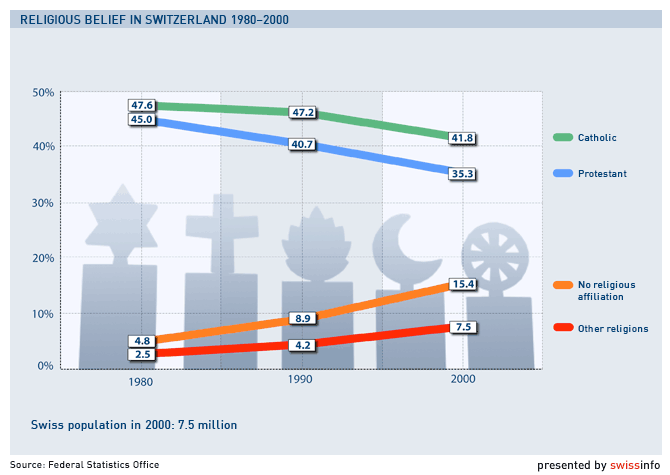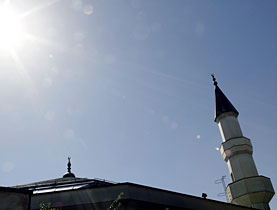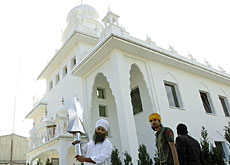Muslims to be offered course on Swiss society

Fribourg University is to be the first Swiss institution to offer a course to imams and Muslim community leaders on understanding how Swiss society works.
The vocational training is also open to non-Muslims with the purpose of fostering cross-cultural knowledge. It has largely been welcomed by the Islamic community.
The course will start in October and is organised by the university, the Group of Researchers on Islam in Switzerland (GRIS) and the Paris-based International Institute of Islamic Thought.
Stéphane Lathion, GRIS head and director of the “Islam, Muslims and Civil Society” course, said there are currently no practical studies on Islam and society in Switzerland.
“The idea is to offer some answers to the federal and cantonal authorities which in recent years have had to deal with problems linked to the Muslim community, such as people not keeping to the principles of Swiss democracy,” he told swissinfo.
“So there’s the problem of how to be sure that imams and community leaders know about Swiss society and on the other hand, Muslims themselves are calling for their leaders to be better trained about the Swiss situation.”
Integration role
Lathion said that apart from their religious duties, many imams played a key role in integration.
“If someone comes from Turkey, Saudi Arabia or Tunisia, they don’t know the Swiss context so the idea is to offer imams or community leaders the tools so they can work better in their daily role in Muslim communities,” he explained.
With more than 350,000 members or 4.3 per cent of the population, Islam is the second-largest religion in Switzerland. Twelve per cent of Muslims have a Swiss passport.
The course will encompass modules on history of religion and European and Swiss society, as well as elements of Muslim theology adapted to the European context.
Vocational modules, which can be taken separately by health or social work professionals on job-related issues, will be a first in Europe, says Lathion.
Headscarves, for example, might be tackled in the health module where wearing the veil at hospital would be discussed.
More than 50 experts, including many from the Muslim community, will help teach the course, which runs until June 2010.
Minaret debate
“The situation is not yet too serious in Switzerland concerning relations between Muslims and non-Muslims compared with what’s happening in France, Germany and Britain, but we have to anticipate any future issues,” said Lathion.
The heated debate about whether to allow minarets in Switzerland proves that it is the right moment to tackle difficult questions, he added.
“We should have debate on Islam and Muslims in Europe, but contrary to the debate on minarets, we should keep it on what can be done and not on the level of fantasy and emotion,” said Lathion.
Community leaders’ feedback on the course has mostly been positive. The Federal authorities are also watching its progress.
Ender Demirtas from the Foundation for the Muslim Community in Geneva said that the project had a wide reach – non-Muslims could learn more about Islam and the Muslim community would be able to better organise their community leader training.
He said that he thought that some Muslims would participate, but that some might be reticent because the project was new.
“You have to look at it in the long term and it is more important to train and interest the future generations,” Demirtas, who would like to send two young people to the course, told swissinfo via e-mail.
Community reaction
The Inter-Knowing Foundation in Geneva, which promotes relations between Muslims and non-Muslims, is also on board. Spokesman Hafid Ouardiri said that his institution had already put forward the idea of having a humanities and Islamic studies centre in 2003 and had been following the issue ever since.
“We agree with the initiative to do something on civil society and Islam, but Muslims should really do this themselves because it’s important that it comes from them,” he told swissinfo.
“People don’t want a situation like in France and don’t want the feeling that something has been imposed on them.”
But he stressed it was important to be a partner and to work towards having a good quality course. It is important for societies to live together in dignity and friendship and communication is key to this, added Ouardiri.
For his part, Lathion says a civil society course is a better solution than any Swiss training for foreign imams, which would not be accepted by the Muslim community.
“What we are proposing doesn’t interfere on a theological basis and we don’t judge anyone who might have had training in Tunisia or elsewhere,” he said.
swissinfo, Isobel Leybold-Johnson
The course, the full details of which were made public on March 13, can be carried out around professional working lives and is made up of 23 attendance days. The full course is made up of 400 hours. Modules can also be taken separately.
It starts in October 2009 and ends in June 2010 and takes place at the Further Education Centre at Fribourg University.
More than 50 experts will be teaching. Mohamed Mestiri, director of the International Institute of Islamic Thought is in charge of the Islamic studies topics.
Not many courses of this type are to be found in Europe. The Catholic University of Leuven in Belgium runs a similar programme.


In compliance with the JTI standards
More: SWI swissinfo.ch certified by the Journalism Trust Initiative












You can find an overview of ongoing debates with our journalists here . Please join us!
If you want to start a conversation about a topic raised in this article or want to report factual errors, email us at english@swissinfo.ch.